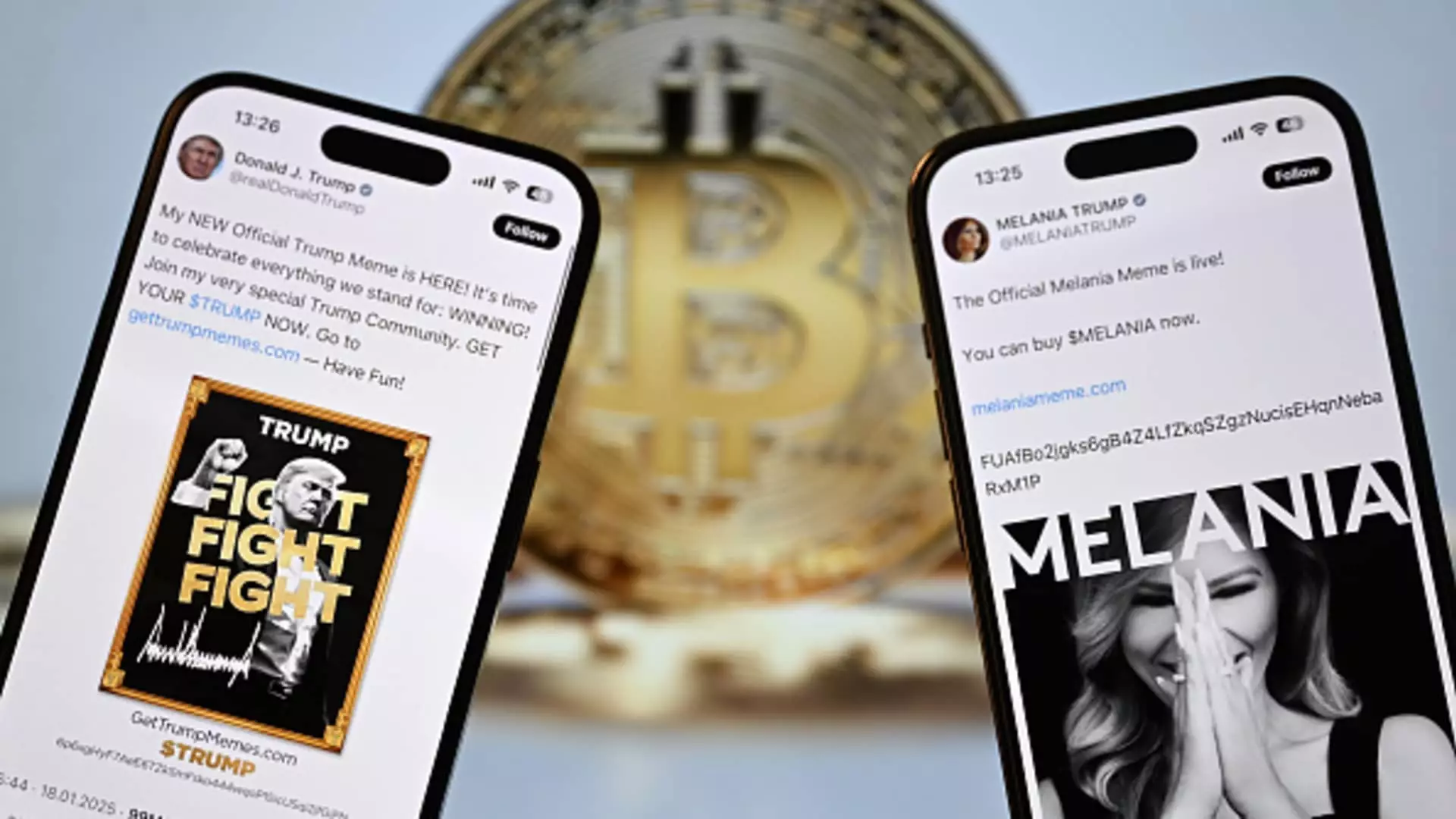The world of cryptocurrency has always operated in a realm of innovation and disruption, but the intersection of political influence with this digital landscape has added another layer of complexity. With the 2024 election looming large, the ascent of pro-cryptocurrency candidates, particularly President Trump’s entry into the crypto space, has ignited both excitement and concern among investors. As the dust settles from the initial post-election euphoria, however, a darker narrative seems to be emerging. Investors now grapple with the implications of a political figure’s foray into crypto, which could potentially usher in a new era of volatility reminiscent of past market downturns or “crypto winters.”
The recent launch of various meme coins tied to Trump’s brand, such as the “official Trump meme coin,” offers a glimpse into how hype and celebrity influence can drastically shape market dynamics. Notably, reports suggest that nearly half of the purchasers of these tokens were first-time investors, sporting freshly minted crypto wallets created on the same day. This influx of novice investors raises alarms about the sustainability of the market. The enthusiasm surrounding meme coins is often seen as akin to gambling, leading some industry insiders, such as Tyrone Ross of 401 Financial, to criticize the trend. He argues that instead of focusing on speculative assets, the industry should channel energies into technological advancements and fostering long-term value—a point that highlights the ongoing struggle between innovation and frivolity in the crypto space.
While platforms like Coinbase and Robinhood may reap immediate benefits from the trading frenzy, the significance of these meme coins in shaping a credible investment strategy remains questionable. As financial analyst Devin Ryan points out, the genuine promise of cryptocurrency lies not in these speculative tokens, but rather in their potential to facilitate groundbreaking uses for blockchain technology—encompassing elements such as staking, stablecoins, and payments, among others. The shift from an online casino atmosphere to a focus on utility-driven projects is critical for the maturation of the cryptocurrency ecosystem. However, new initiatives, such as Trump Media’s TruthFi, which aims to invest heavily in related assets, could paradoxically reinforce the market’s speculative nature rather than enhance its utility.
The relentless introduction of new tokens and products can dilute the inherent value of existing cryptocurrencies, as echoed by voices such as Steven Lubka from Swan Bitcoin. The phenomenon, widely referred to as dilution effect, is seen as a significant hurdle for cryptocurrencies striving to maintain their value amidst an onslaught of alternatives. Without showcasing the utility of blockchain technology beyond speculation, the broader public may remain skeptical of its practical applications. Consequently, while Bitcoin has recently demonstrated resilience, holding above $100,000 and serving as a bellwether for the market, altcoins appear to be languishing. This divide could ultimately hinder the overall progress of the cryptocurrency industry.
The cryptocurrency market has undergone rapid cycles of boom and bust, with earlier examples in 2017 and 2021 highlighting the propensity for fleeting enthusiasm to lead to significant downturns. As some analysts note, the current environment portends more difficulties ahead. Wolfe Research analyst Rob Ginsberg’s observation that altcoins have struggled to keep pace with Bitcoin’s gains underscores a critical inflection point in the market. Unlike previous uptrends, this period appears to be characterized by an entrenched divergence, with long-term investors now advised to gravitate toward established assets like Bitcoin rather than the burgeoning pool of altcoins.
As cryptocurrency continues its journey into mainstream finance, the implications of political involvement cannot be underestimated. The fusion of political figureheads with crypto ventures raises questions not merely about regulation or endorsement but about the very character of this burgeoning market. While excitement lingers around new developments, the challenge remains: how do participants in this digital economy foster a culture of innovation, accountability, and utility that transcends speculative bullishness? Only by cultivating a more sophisticated understanding of cryptocurrency—away from its casino-like reputation—can stakeholders hope to unlock its true potential, ensuring that financial growth is rooted in genuine technological advancements rather than mere political whims or meme-driven hype.

